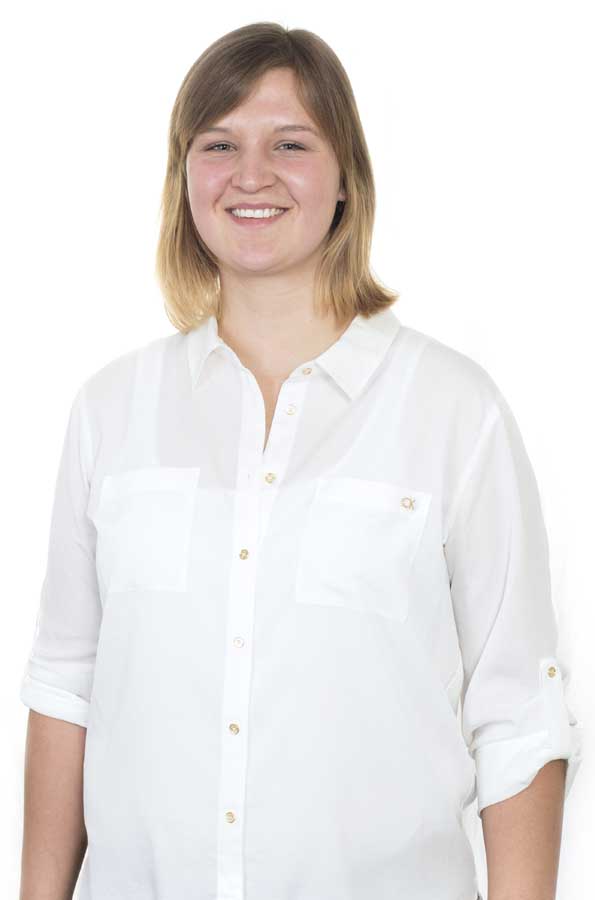family background / Ariane is the oldest of four siblings who make up the family’s 10th generation of farmers. To help in preparation for future transition of the farm, she earned her horticulture degree, interned with the Washington Tree Fruit Research Commission (WTFRC), and plans to work with her parents, younger sister Britta and brother Kai on new techniques she’s learned in the U.S. Ariane is the daughter of Gerd and Petra Stechmann. She was interviewed in Yakima, Washington, during a recent internship with the WTFRC.
grower / Altes Land, Hamburg, Germany
age / 22
crops / Apples and cherries
business / Obsthof Stechmann, Guderhandviertel
 How did you get your start?
How did you get your start?
I started working on the farm when I was a kid because my parents always wanted me to earn the things I had, like a new toy or something like that. I started by picking apples, then driving tractor, picking cherries and sorting on the packing line. Sometimes I hated it, other times I loved it.
When I was 14 years old, I took part in a school internship program working in other types of jobs. I recognized at that point I really enjoyed farming and it was what I wanted to do.
After high school, I took an internship in fruit growing, working four days a week on a commercial farm with the fifth day attending class at a vocational school. It was a two-year degree program, similar to what I’d call a practical bachelor’s degree.
These programs are very good, and a typical type of education in Germany, especially for fruit growing.
What did you learn?
I had the opportunity to learn about two sides of fruit marketing, the direct sales and distribution to large markets.
I learned about other crops like strawberries, blueberries, raspberries, pears, apricots and peaches — even potatoes — because they sold a wide array of products.
My boss enjoyed farming and liked to try out new stuff, whether it be new fruits or training systems. For me, that internship was very interesting to see how he dealt with new ideas.
Do you plan to bring that marketing experience home?
Our family farm doesn’t pursue marketing opportunities for the most part. Many of the farms in our area grow, harvest and pack the fruit on their own.
Once packed, the fruit goes to a distributor who will sell it to bigger supermarkets. My parents don’t work with a lot of other people and customers because it’s not what they enjoy.
The internship opened my eyes to new possibilities to make money. I learned that you don’t necessarily need this step in between the farm and consumer. Distributing is a hard job; however, I feel it’s an opportunity to have complete control of your crop.
How do you look at family farm transition?
Our family has not had a lot of discussion about this yet. Being the oldest, I don’t think they’ve wanted to pressure me to take over the farm just yet.
I think they wanted the choice of coming back to be mine. Regarding farm transfer, I’ve learned that families should start the transition as soon as possible. That way if something tragic happens, like your father dying, responsibilities are planned out.
How would you like the transition to work?
When I take over the farm with two of my siblings, I think it’d be great to arrange things so one person takes care of the growing, one takes care of the packing house and the third takes care of distribution.
I’ve seen family business plans like this while interning in the U.S. I’ve learned that many growers’ kids have separated their businesses like this.
What is your farm like and what challenges are unique to the area?
In our area, the climate is similar to New York. Area farms are actually under sea level with heavy soils and a lot of humidity. We have issues with canker and other viruses.
Because of the moisture, we need to use rain covers to prevent cherries from cracking. In general, it doesn’t make sense to grow cherries without covers.
We also can’t do as much postharvest protection as U.S. farms can do. So, we can’t use wax or fungicides. As soon as the apples are off the tree we are not allowed to treat them with anything as required by law.
Why do you enjoy farming?
There are several things that I am passionate about farming. One reason is that you can work outside all day, most of the time with a team. I think the fruit growing business is like a big family.
When I traveled to New Zealand, then to the U.S., I’ve met many of the same types of people. Even though fruit growing is a big business, everyone works together, sharing information around the world.
You can learn from so many different people, helping you not repeat the same mistakes as they have.






Leave A Comment